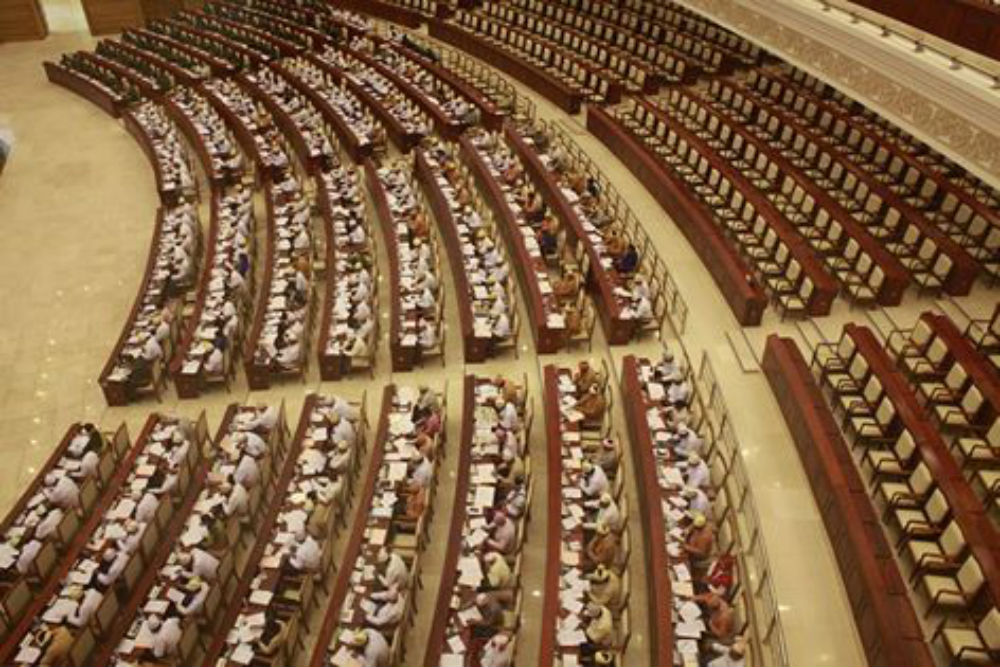The Telecommunication Law was enacted on October 8, 2013. It was aimed at developing the telecoms sector, including establishing a network that covers the whole country.
The law also prohibits stealing money or any property, fraud, misappropriation or mischief using any communication network, extortion of any person, coercion, unlawful restriction, defamation, interfering, undue influence, or intimidation using a telecommunication network.
Since then, two foreign telecom companies were allowed to invest in Myanmar, prompting the price of sim cards to plummet from hundreds of dollars to just over $1, leading to millions of people to own mobile phones.
However, this law also appears to have been used for political purposes, with a few people currently under arrest for postings on Facebook deemed to have defamed prominent people.
The National Education Law was enacted on September 30, 2014. This law was intended to let universities and colleges administer themselves, to provide free education at a primary level, and allow student associations.
The Parliament approved it and swiftly despite criticism that the law did not go far enough to make the educational institutions independent and that important stakeholders were not consulted. This caused students to take to the streets in protest, leading to a violent crackdown. Cases against the students and controversies surrounding their arrest and detention continue.
The Union Parliament amended this law on June 18, 2015, which included a provision that representatives from student and teacher unions could get seats on university governing committees.
3. The Vacant, Fallow and Virgin Lands Management Law and The Farmland Law
These two laws were enacted on March 30, 2012.
The first bill allows local and foreign investors, government departments, non-governmental organisations, and farmers to apply for the rights to work on and utilise vacant, fallow and virgin lands to carry out agricultural projects, livestock breeding, mining and other government approved legal projects.
Under the Farmland Law, once the owners have registered their land, they have the right to sell, pawn, lease, exchange, donate, and/or enter into a joint venture.
Although the law pleased the famers whose lands were not confiscated, it did not benefit those whose lands were seized during the military regime, triggering farmers’ protests in many parts of the country.
The Labour Organization Law was enacted on October 11, 2011.
The law stipulated that labour organisations may be formed by a minimum of 30 workers working in the relevant trade or activity according to the trade or activity.
Although the minimum wage law, labour dispute resolution law and labour welfare law were enacted, the problems of labour affairs are ongoing. Labour rights advocates have criticised that the existing labour laws are not effective enough to ensure the rights of labourers, with one reason being that there are only cash penalties against the employers who broke the law.
The Anti-corruption Law was enacted on August 7, 2013.
The law defines that if any holder of a political office is convicted of committing bribery, he/she faces up to 15 years in prison and a fine. For anyone who is not holding political office, the penalties are 10 years and a fine.
It also stipulates those who lodge a complaint is found to have defamed anyone, or the complaint is based on false evidence, he/she faces up to 5 years and a fine.
The law was intended to fight corruption, for which Myanmar has been notorious for decades. Critics, however, said enforcement of this law is still weak.
The Anti-corruption Commission said there are more than 200 cases under this law so far but criticism has not died down that corrupt senior government officials have not been punished.
6. The Right to Peaceful Assembly and Peaceful Procession Act
This law was enacted on December 2, 2011.
Under this law, the potential protesters are to apply for an official permission from the police five days in advance. Those who hold an unlawful assembly are criminally liable, facing a punishment of one year in jail or a fine of 30,000 Kyats (around $25), or both.
Legal experts say the law does not meet the rights for freedom of expression prescribed in the 2008 State Constitution.
Many political activists, farmers, workers, and students have been arrested under this law.
The Contempt of Courts Law was enacted on July 29, 2013.
It prohibits writing, publishing or distributing anything that could scandalise the court, affect a case, impair public’s trust on the judiciary and before decisions are passed.
8. The Environmental Conservation Law
The Environmental Conservation Law was enacted on March 30, 2012 to protect forests, mineral resources, maritime resources, agricultural system, ecosystem, wildlife areas, endangered species, biodiversity, natural plants and cultural heritages.
The government said the law was to manage foreigners investing in these sectors in the country but critics said it was to protect controversial projects such as Myitsone dam and Letpadaung copper mine.
9. Monogamy Law, Religious Conversion Law, Interfaith Marriage Law and Population Control Law
The four sets of these laws were enacted between May 19 and August 31, 2015. These are widely known as the “Race and Religion Protection Laws”. International rights groups have criticised these laws as being designed to discriminate against the Muslim minority in Myanmar.
10. Registration of Organizations Law (also known as Associations Registration Law)
The Registration of Organizations Law was enacted on July 18, 2014. Local and foreign non-government organisations are permitted to register under this law.
The government says the law is intended to provide for the free formation and movement of organisations as well as regulating the relationship between NGOs, INGOs and relevant government ministries.
This story was published by Myanmar Now on December 13, 2015
(Additional reporting by Kan Zon Nway, Editing by Ros Russell)





Reader Interactions